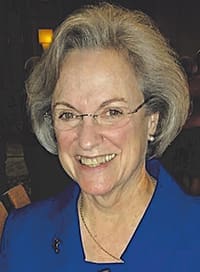Atlanta
Religious in Atlanta inspired Sister Sharon Euart’s Mercy vocation
By PRISCILLA GREEAR Special to the Bulletin | Published October 6, 2016
ATLANTA—Sister Sharon Euart served for over a decade as the first female associate general secretary of the U.S. Conference of Catholic Bishops, opening doors for women in church leadership. Her pioneering started young in Atlanta when she was a member of the first four-year graduating class of St. Pius X High School.
Now 72, the Mercy sister just celebrated her golden jubilee and reflected on the joyful adventure of following God wholeheartedly through consecrated service. Her siblings in Atlanta, John Euart and Linda Euart Kelleher, and other family members traveled in September to Baltimore for her 50th anniversary Mass.
“My heart is filled with gratitude and hope for the years ahead,” said the active religious, jokingly affirming the word on the street that “70 is the new 50.”

Sister Sharon Euart, RSM
“It’s been a privilege for me to be a Sister of Mercy and serve God and the church. I’ve been provided so many wonderful opportunities in ministries where I’ve been able to experience the gifts of others and the presence of God in ways I couldn’t even imagine,” she said.
Sister Sharon was taught by Sisters of Mercy at Our Lady of the Assumption School, Atlanta, and at St. Pius, drawn to their joyful service. She then headed up to a Mercy college in Baltimore and entered the congregation—living for a time at the convent alongside her high school math teacher.
She started out as a high school Spanish and Latin teacher, then an administrator. Later she became the first to complete a new internship in archdiocesan administration to promote women in church leadership, eventually becoming director of research and planning for the Archdiocese of Baltimore. She also earned master’s degrees from Johns Hopkins University in liberal arts and administration and supervision and her doctorate in canon law from The Catholic University of America.
Canon law revision opened doors
“At the internship for church management, it helped me to identify skills I might have in administration and leadership. I tried to develop them the best I could and use them in situations where it would be appropriate. And most important, I tried to find ways to use them where they would be of service to others and the church,” Sister Sharon said. “The internship of women in church management was probably one of the greatest experiences I ever had because it led me to the ministries I had after that.”
She became the then-National Council of Catholic Bishops’ associate general secretary in 1989 when leadership positions traditionally held by priests opened to laity due to a revision in the Code of Canon Law.
“If you’re competent and confident about what you’re doing, it will all work out,” Sister Sharon said. “I was eager to learn and knew my role was to serve the bishops, and as long as I filled that role as best I could it was a very positive experience.”
“I was new being a woman in that role. But I learned so much and I found I was able through the position to not only work with an incredible and talented staff of people, but I came to know the bishops and tremendous good they were doing for the church in their dioceses.”
She later served as executive director of the Canon Law Society of America and enjoyed helping the bishops and faithful to see canon law “as a help to them and not a hindrance” and laypersons to understand their rights and obligations.
“When a diocese has a parish council or a pastoral council, lay people have the right to let their opinions be known and have the obligation to listen and be informed,” she said. “It’s helping people understand their role in the church and that they are part of the church—they are the church.”
Helping religious congregations
Characteristically cheerful, she now serves as the executive director of the Resource Center for Religious Institutes in Silver Spring, Maryland, where she guides religious congregations on canon and civil law, including helping communities in decline to “come to completion.” But she remains positive about evolving religious life. She was recently in Atlanta for the assembly of the Leadership Conference of Women Religious where the future of religious life was a focus.
Sister Sharon said, “While the number of sisters is expected to continue to decline, there are new forms of religious life developing, new orders and movements in the church that have lay people, religious and priests. I think there’s going to be a smaller number of consecrated, vowed religious, whereas we will have a larger number of lay people devoted to service in the church.”
She noted that lay people in some instances are being formed in the charism of a particular congregation. She cited Catholic hospitals where there are more lay people than in the past and fewer sisters.
“You’ll find fewer (sisters) in Catholic hospitals, but lay people have taken over those roles. And many have gone through formation programs and training in the charism of a particular religious order to help their charism continue so that these institutions remain inspired by that spirit,” she said.
For a half century, prayer has fueled her love for God and the church.
“One of the things we learned when we entered the convent is the importance of prayer. I try to spend 45 minutes to an hour in prayer each day. That is where we’re rooted, in prayer—and to receive the Eucharist whenever possible.”